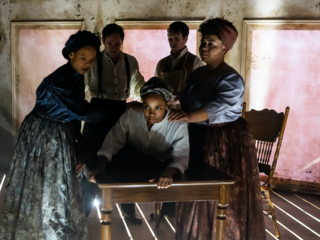Play
A New Play Shines a Spotlight on Women Long Forgotten
A review of Behind The Sheet.
Posted February 22, 2019

In the years leading up to the Civil War, about a dozen or so female slaves were part of a series of gruesome experiments that culminated in a huge advance in gynecology.
They were operated on over and over in a ramshackle shed in Dr. J. Marion Sims’ Alabama backyard. Sims was determined to figure out a way to heal vaginal tears caused by long labors.
He succeeded and became world famous. In addition to his surgical cure—a technique that would spare women worldwide some of the ravaging consequences of giving birth—Sims also invented the speculum and founded a woman’s hospital in New York. For more than a century he was hailed as one of the great humanitarian physicians.
For years, the story of J. Marion Sims focused on his achievements. But lately, his story has been revived without glossing over his journey to prominence, culminating not only in heated discussions.
Yet, however the story is told, the spotlight has always been on Dr. Sims. Harriet A. Washington wrote about him in Medical Apartheid. Her book along with subsequent articles prompted protests that resulted in the removal of a Sims statue that had been on Fifth Avenue in New York City. Deborah Kuhn McGregor wrote about him in From Midwives to Medicine. I also wrote about Sims and his legacy in Get Me Out: A History of Childbirth from the Garden of Eden to the Sperm Bank.
But who are these women? There are no diaries, nothing about what they had to say. We know the names of three of them. Lucy. Betsey. Anarcha. So when we write, they become two-dimensional, lumped together in one group: “The slave women.” To be sure, Washington dug deep to bring a voice to Anarcha Wescott, but so many of the women have remained anonymous because we just don't have the information.
Now, Charly Evon Simpson, a playwright, has given voice to the voiceless. Her new play, Behind the Sheet, is inspired by the real events allowing her to shift the spotlight from Simms to the slaves.
We meet these young pregnant slaves who endured operations—some of them had up to 30 surgeries. But for the first time, we are forced to imagine them in three dimensions, as yearning, bonding, compassionate, jealous, hurting women. Simpson gives these women agency.
Ben Brantley in the New York Times said the production “takes on cumulative power in its steady, clear-eyed depiction of a time when it was a given that pain would be borne uncomplainingly by human beings regarded as chattel.”
While some of the dialogue is lifted right from J. Marion Sim’s autobiography, Simpson adds a plot twist.
In her play, the doctor is George Barry. We also meet Philomena, his assistant/pregnant mistress/slave. In real life, there was no Philomena. Or rather, there’s no record of Sims having a mistress or impregnating a slave. I found the injected storyline added heft to the play—we see his own mistress suffering and we see happens to her after her child with him causes her to suffer from tears. We see what happens to her after Sims finds his cure and heads north.
Harriet Washington, the Medical Apartheid author, ethicist, and historian, applauded the play as a must-see—but, as she wrote in Nature, the Philomena addition “muddies the already murky ethical waters of volition, coercion, sentiment and motivations.”
The night I went, there were audible gasps from the audience. The woman behind me sobbed. I assumed people went for the reason I did. We knew the story and were curious to know how this fictionalized version would come alive on stage. But perhaps this was news to some of them. And that’s a good thing. This is an important chapter in medical history that needs to be debated in wide circles outside of academia.
Simpson, in an interview with Science Friday, said that her goal was not to bring what has been written to the stage but to infuse life to the women, long forgotten. “I’m a black woman and have ancestors who were enslaved,” Simpson said. “I wanted to give them back the humanity that society at the time stripped way.”
Behind the Sheet had sold-out performances at the Ensemble Studio Theatre and is now extended until March 10th. Here's more information about the show.




